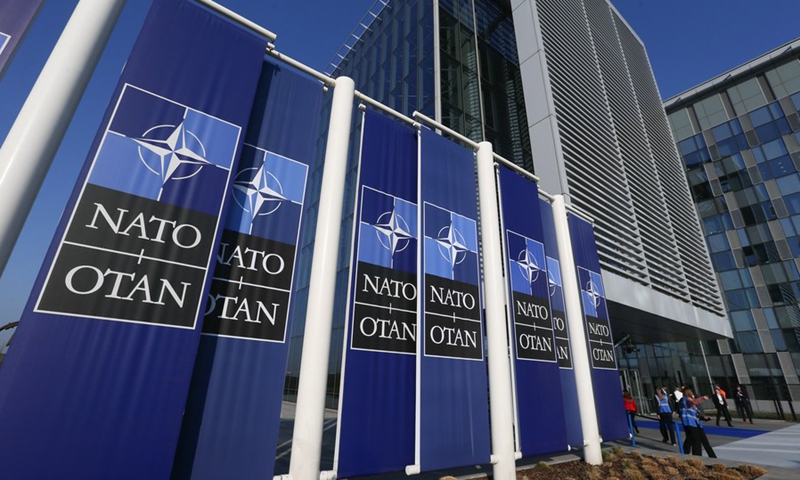
Staff members work at the NATO Headquarters in Brussels, Belgium, March 24, 2022.(Photo: Xinhua)
NATO is mobilizing some 90,000 troops to hold its largest exercise since the Cold War this week, which is scheduled to run through May, prompting Russia to say that the scale of the exercises marks an "irrevocable return" of the alliance to Cold War schemes, according to media reports. Some Chinese experts see the holding of a drill of this scale as primarily aiming to consolidate its military morale when the Russia-Ukraine conflict will soon mark its second anniversary and Ukrainian forces make lackluster achievements on the battlefield.
Some 90,000 troops are due to join the Steadfast Defender 2024 drills that will run through May, in which more than 50 ships from aircraft carriers to destroyers will take part, as well as more than 80 fighter jets, helicopters and drones and at least 1,100 combat vehicles including 133 tanks and 533 infantry fighting vehicles, Reuters reported, citing NATO.
NATO's upcoming military exercise raises the risk of unintended military confrontation and undermines security in Europe, Russian Deputy Foreign Minister Alexander Grushko told Sputnik on Sunday.
NATO is conducting such large-scale military exercises primarily to consolidate its military morale, especially given the current instability within NATO ranks and the prominent contradictions among its member countries, Song Zhongping, a Chinese military expert and TV commentator, told the Global Times on Monday.
"Given the lackluster achievements of the Ukrainian forces on the battlefield, NATO is compelled to consider strengthening its military capabilities. Consequently, NATO finds it necessary to adopt defensive measures," Song said.
As the conflict between Russia and Ukraine will soon approach the two-year mark, NATO countries have been spreading "war panic" against Russia.
Admiral Rob Bauer, a top NATO official, warned on Thursday that civilians must prepare for all-out war with Russia in the next 20 years, Telegraph reported.
Germany's Defense Minister Boris Pistorius also warned that Russia could attack the NATO military alliance in less than a decade, Politico reported on Friday. Meanwhile, German troops could be deployed in Poland for the first time since WWII to strengthen NATO's eastern flank against any threat posed by Russia, according to Newsweek.
Those countries have been hyping up the threat of Russia for their own purposes, Cui Heng, an assistant research fellow from the Center for Russian Studies of East China Normal University, told the Global Times on Monday.
"For countries like the Netherlands and Norway, while the Russia-Ukraine conflict has brought about high inflationary pressure, they also reap significant benefits, such as from energy exports," Cui said.
Following US indications that it may reduce military aid to Ukraine, some countries stepped forward to offer assistance, thereby prolonging the war, the expert noted. "In the process of reactivating NATO, these nations have played a crucial role, aligning perfectly with their stance of benefiting from the conflict and favoring its prolongation."
Some experts also noted that NATO's regression to a Cold War scheme is not only evident from this particular military exercise. Developments such as Sweden and Finland applying for NATO membership, the alliance's further eastward expansion, and its expansion in Asia all signify NATO's reactivation, they said.
"NATO's operations now stretch far beyond the confines of the North Atlantic, expanding its reach into the Asia-Pacific region. Countries like South Korea and Japan have partly joined NATO's partnership programs," Cui said.
NATO's activities have escalated beyond Cold War levels on a global scale, signaling that the world's peace and development might be facing significant challenges, he said.
Rather than NATO per se, it's more accurate to say that it's the US that's perpetually stoking fears of a Russian threat, some experts said.
"By inflating the Russian threat, the US incites unprecedented panic among NATO member states so that it can compel NATO allies to heed American directives, escalates their military spending, and induces them to purchase more American-made weapons." Song said.
By ensnaring European nations, including NATO members, into a state of economic distress and national decline, the US is maneuvering to align these countries with its interests. Only when these nations are more aligned with the US can it effectively lead and direct them, serving America's strategic interests, the expert said.




